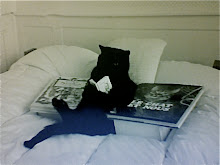Joanna Chmielewska, originally uploaded by erizone.
Joanna Chmielewska at a book signing in Moscow (Photo by erizone via Flickr)
I'm a fan of Chmielewska's comic crime novels. I say it with significant difficulty because I've been trying to hide this since high school. Her novels are rather simple and once you've recognized her patterns, they come across as straightforwardly formulaic (even for the genre). And yet.
I really like her earliest novels, the ones she wrote in the 60s and the 70s, though these novels present the communist militia as effective crime-solving agents of justice, somewhat naively explore the comic potential of the travel restrictions, citizen control, and turn into laughs the dearth of products and produce in a country that produced so much.
(For those who haven't experiences it, the spirit of the era is captured in the words of the grandmother from Juliusz Machulski's comedy about time travel, Ile waży koń trojański?: "If the USSR owned the Sahara, they would run out of sand." Everything was exported to the USSR, nothing was ever gotten in exchange but words of "a lasting friendship between the countries.")
Unlike the director Stanisław Bareja and the authors whose books were either chopped up or banned by the censors, Chmielewska didn't ridicule the People's Republic -- she eulogized it.
Is that my problem with Chmielewska? Actually, no. It is no secret that some people miss the regime or that their lives were in many respects better before 1989. In some -- significant -- respects it benefited women. A difficult economic situation was legally and widely recognized as an appropriate reason for a woman to get an abortion, if she wished to get one; it was deemed logical that a woman would want to work, that there should be kindergartens and school lunches. But of course there was also sexism and pay inequality.
And yet -- the measures that existed mattered immensely. That became obvious once they disappeared. Chmielewska's quirky thirty-year-olds wouldn't have been able to solve any crimes in the 1990s.
So they turned sixty and plunged into nostalgic fantasies. And the author declared that she absolutely wasn't a feminist. Rejecting the label is one thing, but she went further, offering piles of nonsense about "women's nature," delicate femininity, and the family.
I stopped reading her for several years not only because her books became dreadfully boring but mostly because I couldn't stand her searing hypocrisy.
Here is what I enjoyed about her writing (and am enjoying again with the fabulous radio adaptations of her early novels):
 Chmielewska's protagonists are single mothers or unmarried women in their 30s and 40s -- independent, going where they're not allowed to go in order to solve mysteries or gamble (horse races and casinos recur). Her most frequent protagonist and alter ego, Joanna, is divorced with two sons, she spends more time hanging out in cafes with friends and new love interests than cooking soup for her kids. From one of the novels we learn that she had left her sons in Poland for a year to work in Copenhagen as an architect, explore nightlife, and gamble. For the money won at horse races she buys a car and snakeskin stilettos.
Chmielewska's protagonists are single mothers or unmarried women in their 30s and 40s -- independent, going where they're not allowed to go in order to solve mysteries or gamble (horse races and casinos recur). Her most frequent protagonist and alter ego, Joanna, is divorced with two sons, she spends more time hanging out in cafes with friends and new love interests than cooking soup for her kids. From one of the novels we learn that she had left her sons in Poland for a year to work in Copenhagen as an architect, explore nightlife, and gamble. For the money won at horse races she buys a car and snakeskin stilettos.The CD edition of the radio play about the novel I've just briefly described includes an article about Chmielewska's "accidental feminism."
The article was written by her secretary whom Chmielewska fired shortly afterwards. Coincidence?
Poland is a country where public figures are almost never made to own up to their words and deeds (yes, Polański, among others; yet more strikingly, a former Prime Minister who wanted to outlaw divorce and then abandoned his family for a twenty-something-year-old bank employee).
I've never been employed by Chmielewska so I risk nothing in saying that when I was a teenager her novels gave me hope that I could indeed become who I wanted and not just somebody's wife and mother. I can't make her own up to her hypocrisy but I can point it out.
Note: The second photograph is Krystyna Sienkiewicz as Janka in Lekarstwo na miłość, the film adaptation of Chmielewska's debut novel, Klin (1964).



No comments:
Post a Comment